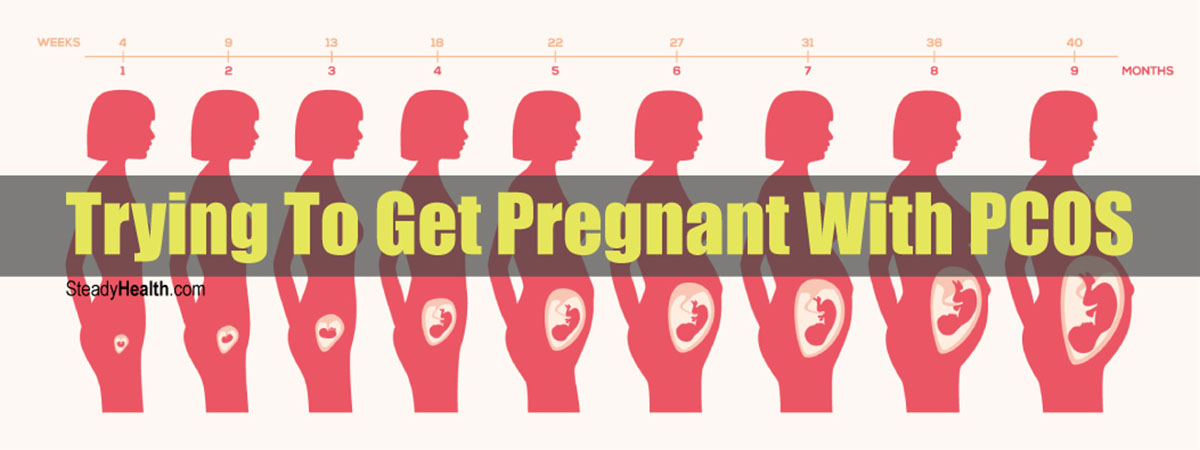Polycystic Ovary Syndrome has been called the most common cause of infertility due to a lack of ovulation, and around 20 percent of all women struggling with infertility and repeated pregnancy loss have been diagnosed with PCOS [1]. Search "how to get pregnant with PCOS", and scary statistics like those will follow you around everywhere you go, so it is easy to conclude that the deck is simply stacked against you before you even start trying to conceive.

A PCOS Diet Plan And Losing Weight With PCOS: Crucial To Improved Fertility?
An estimated 44 percent of women with PCOS are obese [2], and obesity can further contribute to the high blood glucose levels, insulin resistance, androgen levels, and menstrual cycle irregularities that are so common in women with Polycystic Ovary Syndrome. Lifestyle modifications that enable you to lose weight with PCOS lead to improved outcomes on all these counts — and losing just 10 percent of your current bodyweight already makes your menstrual cycle more regular, increases your odds of ovulating during your cycles, and thus improves your chances of getting pregnant naturally with PCOS. [3]
Effective strategies for losing weight with PCOS take the fact that up to 70 percent of women with Polycystic Ovary Syndrome are insulin resistant [4] into account. Research indicates that a low glycemic index diet, also recommended to those who suffer from type 2 diabetes, is the most effective diet plan for PCOS sufferers. A low GI diet leads to improved insulin and androgen levels in women with PCOS, and is more likely to help you lose weight than a conventional healthy diet, one study found.
Another study of PCOS patients found that Italian women, who consume less saturated fat, have lower obesity levels than American women with Polycystic Ovary Syndrome [6].
If you want to know more, please refer to foods to eat if you are trying to lose weight with Polycystic Ovary Syndrome and foods to avoid if you are trying to lose weight with PCOS. Meanwhile, here are some quick tips:
- Do your best to stick to carbs with a glycemic index of 55 or less.
- Organize your meals into three sections — eat 50 percent vegetables, 25 percent protein, and 25 percent low GI carbs during mealtimes.
- Make sure saturated fats do not make up more than six percent of your daily calorie intake.
Medical Fertility Enhancement For Women With PCOS
If you have been trying to conceive without success for a while now, or you simply believe that the most efficient path to pregnancy involves your doctor's help, a number of medical options that increase your fertility are at your disposal.
You may have heard that the birth control pill can help lower androgen and insulin levels in women with PCOS while increasing menstrual cycle regularity [8], but since oral contraceptives are clearly designed to prevent you from getting pregnant, you may be surprised to hear that they might also be able to help increase your odds of conceiving naturally with PCOS!
Metformin (Glucophage) for losing weight with PCOS is prescribed quite often, but the drug, which makes the way in which your body uses insulin more effective, is also sometimes prescribed in combination with birth control pills to increase your chances of conceiving.
Clomiphene citrate (Clomid) is, meanwhile, a drug that induces ovulation, and it is often seen as a first-line treatment for PCOS-related, anovulatory, infertility. While Clomid certainly increases your chances of getting pregnant, one study found that Clomid is, again, more effective when it is combined with Metformin. [10]
Should those medications not help you conceive, your doctor may also recommend:
Finally, IVF can help you conceive with PCOS, and you'll be interested to know that losing weight improves your chances of getting pregnant with IVF if you are obese [13]. You should also know that Metformin plays a role here, as well — women with PCOS who are undergoing IVF have higher success rates if they are prescribed this drug at the same time [14].
- Photo courtesy of SteadyHealth.com


Your thoughts on this